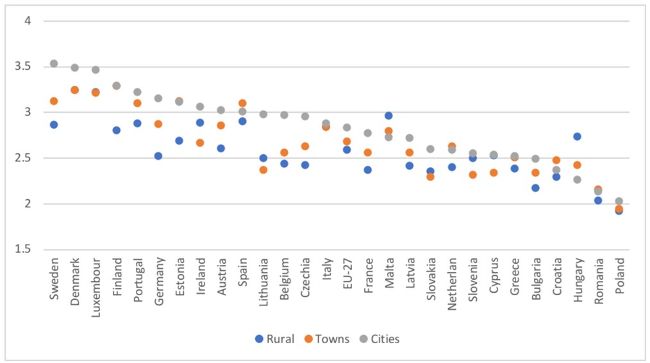Europe's rural-urban divide and the crisis of recognition

Massimiliano Mascherini
The recent wave of farmer protests across Europe, ostensibly triggered by economic concerns and environmental regulations, has exposed a deeper fissure in the continent's social fabric, a growing divide between urban and rural communities. This divide, often overlooked or underestimated, also emerged in the outcomes of the recent 2024 French elections. It is not merely a matter of economic powerlessness and alienation, pushing individuals towards populist movements that promise to restore their voice and dignity.
The results reveal that in all but two Member States those living in cities perceive higher levels of individual political recognition and respect than those living in rural areas.
Eurofound (2023) operationalised the concept of the political recognition gap in the fifth wave of Eurofound's Living, Working and COVID-19 e-survey. Specifically, survey respondents were asked to what extent they agreed or disagreed with five statements on their perception of how they are treated by their governments. The first three items ("The government acts unfairly towards people like me", "The government doesn't respect people like me", and "The government usually ignores people like me") reflect an individual's subjective experience of being acknowledged, valued, and recognised within the political system. The last two items ("The government cares less about people in my area than about people in other parts of the country" and "The government usually ignores my community) reflect broader disparities, but a complex interplay of factors that culminate in a crisis of recognition, where rural residents feel increasingly marginalised, unheard, and disrespected by their governments and urban counterparts.
Hyland, Mascherini and Lamont (2024) argue that at the heart of this crisis lies the political recognition gap, a phenomenon where rural communities perceive a lack of acknowledgement and appreciation for their concerns, values, and way of life. This perception is fuelled by a range of factors, including policy disconnects, lack of representation, cultural differences, and disparities in infrastructure and services.
Policymakers, often concentrated in urban centres, frequently craft policies that prioritise urban concerns while overlooking the unique challenges faced by rural areas. Environmental regulations, for instance, while well-intentioned, can disproportionately burden farmers who lack the resources to adapt to new standards. This perceived disregard for rural livelihoods breeds resentment and a sense of injustice, fuelling the flames of discontent against institutions that are perceived to be led by urban elites.
Moreover, the underrepresentation of rural voices in political decision-making exacerbates this sense of marginalisation. When policies are crafted without meaningful input from those most affected, it reinforces the belief that rural concerns are neither valued nor considered in the political discourse. This lack of political agency fosters feelings of sense of recognition and exclusion experienced at the community or geographical level.
When a significant portion of the population feels marginalised and unheard, it can lead to social fragmentation, political polarisation, and the rise of extremist movements
The results reveal that in all but two Member States (Hungary and Malta, which has a very small rural population), those living in cities perceive higher levels of individual political recognition and respect than those living in rural areas. Looking at perceptions of recognition towards one's community, European residents perceive higher levels of recognition at the community level. However, the advantage is greater for urban compared to rural residents, resulting in an overall larger community (relative to individual) recognition gap.
While the recognition gap is not solely an economic issue, economic disparities undoubtedly exacerbate rural discontent. Rural areas often lag behind urban centres in terms of income, employment opportunities, and access to essential services such as healthcare and education. This economic marginalisation can create a sense of hopelessness and frustration, making rural residents more susceptible to populist rhetoric that promises to address their grievances.
The consequences of this crisis of recognition are far-reaching and pose a significant threat to social cohesion and political stability. When a significant portion of the population feels marginalised and unheard, it can lead to social fragmentation, political polarisation, and the rise of extremist movements. This can undermine trust in institutions, erode democratic values, and create a fertile ground for social unrest.
Addressing this crisis requires a multi-faceted approach that goes beyond simply addressing economic disparities. It demands a fundamental shift in the way policymakers and urban residents perceive and interact with rural communities. This involves several factors:
At the heart of this crisis lies the political recognition gap, a phenomenon where rural communities perceive a lack of acknowledgement and appreciation for their concerns, values, and way of life
Adopting a more place-based and people-based approach to policymaking that recognises the unique needs and challenges of different regions and groups within those regions.

//image from author
Individual recognition, by Member State, and degree of urbanisation
Empowering rural communities by giving them a greater voice in decision-making processes through participatory mechanisms such as citizen assemblies and local councils.
Investing in rural infrastructure and services to bridge the gap in access to essential services and create economic opportunities in rural areas.
Promoting cultural exchange and understanding between urban and rural populations to foster mutual respect and appreciation for different ways of life.
By acknowledging and addressing the crisis of recognition, Europe can progress towards a more inclusive and equitable society where all citizens feel valued and heard, regardless of where they live. This pursuit is not merely a matter of social justice, but also a matter of political stability and the preservation of democratic values.
Massimiliano Mascherini, Eurofound.